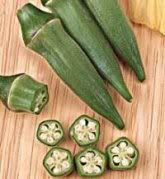What's new this week?
Compiled by Jessica V

Okra (also known as gumbo or lady's finger), is a tall-growing, warm-season, annual vegetable from the same plant family as hibiscus and cotton. Okra is thought to be of African origin and was brought to the United States three centuries ago by enslaved Africans. The immature pods are used for soups, canning and stews or as a fried or boiled vegetable. Okra is a powerhouse of valuable nutrients, nearly half of which is soluble fiber in the form of gums and pectins. Soluble fiber helps to lower serum cholesterol, reducing the risk of heart disease. The other half is insoluble fiber which helps to keep the intestinal tract healthy decreasing the risk of some forms of cancer, especially colorectal cancer. Nearly 10% of the recommended levels of vitamin B6 and folic acid are also present in a half cup of cooked okra.
Nutrition Facts (1/2 cup sliced, cooked okra)
Calories 25
Dietary Fiber 2 grams
Protein 1.52 grams
Carbohydrates 5.76 grams
Vitamin A 460 IU
Vitamin C 13.04 mg
Folic acid 36.5 micrograms
Calcium 50.4 mg
Iron 0.4 mg
Potassium 256.6 mg
Magnesium 46 mg
Storage: Refrigerate unwashed, dry okra pods in the vegetable crisper, loosely wrapped in perforated plastic bags. Wet pods will quickly mold and become slimy. Okra will keep for only two or three days. When the ridges and tips of the pod start to turn dark, use it or lose it. Once it starts to darken, okra will quickly deteriorate. Cooked okra can be stored (tightly covered) in the refrigerator for 3 to 4 days.
Preparation: When cut, okra releases a sticky substance with thickening properties, often used in soups and stews. Gumbos, Brunswick stew, and pilaus are some well-known dishes which frequently use okra. Okra can be served raw, marinated in salads or cooked on its own, and goes well with tomatoes, onions, corn, peppers, and eggplant. Whole, fresh okra pods also make excellent pickles. Its mild flavor can be compared to eggplant, though the texture is somewhat unusual.
Recipes
Compiled by Jessica V
Okra and Corn with Tomatoes
Serve this Carolina favorite over a bowl of long-grain rice with a piece of hot cornbread. The okra should be young, not longer than 2 inches. Vine ripen tomatoes and fresh bell peppers add to the richness of this dish.
- 2 tablespoons each butter and canola oil
- 1 large onion, thinly sliced into rounds
- 2 bay leaves
- 1/2 teaspoon each thyme, red pepper flakes and basil
- 1 green bell pepper, seeded and finely diced
- 3 large fresh ripe, tomatoes seeded and chopped
- 4 ears corn, remove kernels, about 2 cups (may use frozen or canned whole kernel, drained)
- 2 cups small okra pods, left whole or 1/4-inch-thick rounds
- 1/2 cup water or vegetable stock
- 3/4 teaspoon salt
- 1/4 teaspoon black pepper
Arkansas Fried Okra
- 10-12 okra, sliced
- 2 med. potatoes, cubed
- 1 med. onion, chopped
- 1 t. salt
- pepper to taste
- 3 T. yellow corn meal
- 1 T. flour
- 6 T. margarine
Olivia's Potato & Cucumber Salad
Slightly modified version of a recipe in How it all Vegan cookbook.
- 3 C. potatoes, cubed
- 3 C. cucumber, cubed
- 1/3 C. onion
- 2 T. fresh parsley
- 1 T. Dijon Mustard
- 2 T. balsamic vinegar
- 1 T. wasabi sauce
- 1/4 C. flax oil (or extra virgin olive oil, if you prefer)
- 1/4 t. salt
- 1/4 t. pepper
- 1/4 to 1/2 t. Spike brand seasoning (or your favorite seasoning blend)
- Boil potatoes.
- Whisk together oil, parsley, mustard, vinegar, wasabi, salt, pepper, and Spike.
- Once potatoes can be pierced easily with a fork (be careful that they aren't too mussy/overcooked), drain and rinse them with cold water until cool.
- In a large bowl, mix potatoes, cucumbers, and dressing. Adjust seasonings to suit your tastes.

No comments:
Post a Comment